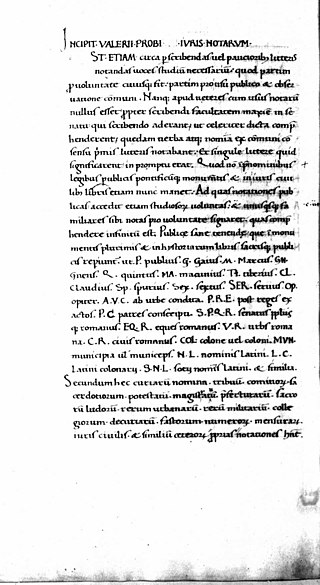Related Research Articles

Quintus Horatius Flaccus, commonly known in the English-speaking world as Horace, was the leading Roman lyric poet during the time of Augustus. The rhetorician Quintilian regarded his Odes as the only Latin lyrics worth reading: "He can be lofty sometimes, yet he is also full of charm and grace, versatile in his figures, and felicitously daring in his choice of words."

Marcus Manilius originally hailing from Syria, was a Roman poet, astrologer, and author of a poem in five books called Astronomica.
Lucius Accius, or Lucius Attius, was a Roman tragic poet and literary scholar. Accius was born in 170 BC at Pisaurum, a town founded in the Ager Gallicus in 184 BC. He was the son of a freedman and a freedwoman, probably from Rome.

Priscianus Caesariensis, commonly known as Priscian, was a Latin grammarian and the author of the Institutes of Grammar, which was the standard textbook for the study of Latin during the Middle Ages. It also provided the raw material for the field of speculative grammar.

Aulus Persius Flaccus was a Roman poet and satirist of Etruscan origin. In his works, poems and satire, he shows a Stoic wisdom and a strong criticism for what he considered to be the stylistic abuses of his poetic contemporaries. His works, which became very popular in the Middle Ages, were published after his death by his friend and mentor, the Stoic philosopher Lucius Annaeus Cornutus.

Marcus Valerius Probus, also known as M. Valerius Probus Berytius or Probus the Berytian, was a Roman grammarian and critic, who flourished during Nero's reign.
Lucius Annaeus Cornutus was a Stoic philosopher who flourished in the reign of Nero, when his house in Rome was a school of philosophy.
Terentianus, surnamed Maurus, was a Latin grammarian and writer on prosody who flourished probably at the end of the 2nd century AD.
Aelius Festus Aphthonius is believed to be the author of a Latin work called De metris omnibus incorporated as part of the Ars Grammatica of the fourth-century AD Christian writer Gaius Marius Victorinus.
Flavius Caper was a Roman grammarian of Latin who flourished during the 2nd century AD.
Aufidius Bassus was a renowned Roman historian and orator who lived in the reign of Augustus and Tiberius.
Aemilius Asper, Latin grammarian, possibly lived in the 1st century AD or late 2nd century AD.
Hyginus, usually distinguished as Hyginus Gromaticus, was a Latin writer on land-surveying, who flourished in the reign of Trajan. Fragments of a work on boundaries attributed to him are found in Corpus Agrimensorum Romanorum, a collection of works on land surveying compiled in Late Antiquity.

The gens Caesia was a minor plebeian family at ancient Rome during the late Republic, and through to imperial times. The first member of this gens to achieve prominence was Marcus Caesius, praetor in 75 BC. Under the Empire, the Caesii were distinguished for their literary achievements.
Hephaestion was a grammarian of Alexandria who flourished in the age of the Antonines. He was the author of a manual of Greek metres, which is most valuable as the only complete treatise on the subject that has been preserved. The concluding chapter discusses the various kinds of poetical composition. It is written in a clear and simple style, and was much used as a school-book.
The gens Septimia was a minor plebeian family at ancient Rome. The gens first appears in history towards the close of the Republic, and they did not achieve much importance until the latter half of the second century, when Lucius Septimius Severus obtained the imperial dignity.
The gens Catia was a plebeian family at Rome from the time of the Second Punic War to the third century AD. The gens achieved little importance during the Republic, but held several consulships in imperial times.
Flavius Mallius Theodorus was a Roman politician and author of an extant treatise on metres, De metris, one of the best of its kind. He also studied philosophy, astronomy and geometry, and wrote works on those subjects, which, together with his consulship, formed the subject of a panegyric by Claudian.
Atilius Fortunatianus was a Latin grammarian. He was the author of a treatise on metres, dedicated to one of his pupils, a youth of senatorial rank, who desired to be instructed in the Horatian metres. The manual opens with a discussion of the fundamental ideas of metre and the chief rules of prosody, and ends with a detailed analysis of the metres of Horace. The chief authorities used are Caesius Bassus and the Latin adaptation by Juba the grammarian of the Τέχνη of Heliodorus. Fortunatianus being a common name in the African provinces, it is probable that the author was a countryman of Juba, Terentianus Maurus and Victorinus.

The gens Persia was a minor plebeian family at ancient Rome. Members of this gens are first mentioned during the Second Punic War, but they only occasionally occur in history. The most illustrious of the family was the satirist Aulus Persius Flaccus, who lived during the middle part of the first century.
References
- ↑ Stover, Tim (5 July 2012). Epic and Empire in Vespasianic Rome: A New Reading of Valerius Flaccus' Argonautica. Oxford University Press. p. 8. ISBN 978-0-19-964408-7.
- 1 2 3 Chisholm 1911.
- ↑ Wolfgang Haase; Hildegard Temporini (1998). Aufstieg und Niedergang der romischen Welt: (ANRW) : Geschichte und Kultur Roms im Spiegel der neueren Forschung : Teil II : Principat. Walter de Gruyter. pp. 3254–. ISBN 978-3-11-015699-7.
- This article incorporates text from a publication now in the public domain : Chisholm, Hugh, ed. (1911). "Bassus, Caesius". Encyclopædia Britannica . Vol. 3 (11th ed.). Cambridge University Press. p. 498.